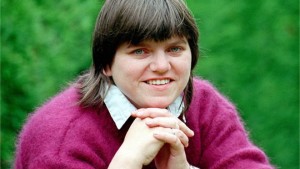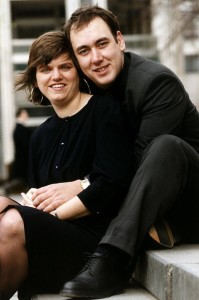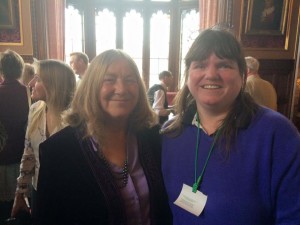Many of us were devastated to hear of the death of our friend Jill Saward on January 5th 2017, at the age of 51. The BBC, national press and social media have responded with many tributes. Here I add two of my own, and links to two BBC programmes where I contributed.
A Tribute to Jill Saward 
The sad news of Jill Saward’s death has reverberated widely, more than most of us could have anticipated. It was headlined by the BBC, featured in newspapers and spread through the social media. Something of Jill’s story has touched a chord with people across the country, so that even many who were not yet born when she first made headline news, have been reporting on her life and mourning her passing.
The anchor point for the media has been, inevitably, the much publicized incident of 30 years ago, when the lives of a vicar’s family in a London vicarage were turned upside down. Burglars, affected by drugs and drink, came for goods to steal, but took what was far more precious: peace and sanctity of body and mind. They violently attacked Michael Saward and his daughter’s boyfriend, and Jill was subjected to torture and repeated rape. When the men were brought to trial, the distorted lenient sentences re rape and burglary, and the dismissive comment of the judge about what he believed the rape victim had suffered, caused a public outcry. Judge John Leonard later regretted his handling of the case, referring to it in his valedictory speech in 1993 as a ‘blemish’ which would be found written on his heart.
Those dreadful incidents have certainly provided the backcloth for the national interest this week, but something much deeper accounted for the enormous coverage: a collective recognition of the power of Jill’s response to her ordeal. The strength with which she overcame the effects of her violation – post-traumatic stress problems, suicidal feelings, loss of self-worth – have all been documented in her obituaries. Jill’s forgiveness towards her violators, her ongoing commitment to challenging rape culture, her advocacy for changes in law have been cemented in a lifetime’s work for rape victims. There is no doubt that this has stirred the public heart. The experts – who became Jill’s colleagues in many campaigns – have testified that because of her tireless work, it is harder now for women to be raped with impunity.
I have known Jill for many years and have had enormous admiration for her. Even in the early days – in the 1980s – she was willing to go beyond her comfort zone to speak to young people at Greenbelt about the reality of God’s love in the most appalling circumstances. I was worried at first about this exposure. All too often the church is happy to make capital from the faith of Christian victims, without ensuring that those same people are cocooned in the unconditional love and support of fellow believers. Thankfully, Greenbelt was not like this. I was asked by them to monitor how Jill was coping and what she wanted to do, staying close by, in case there needed to be any change to the programme. She coped well. For me, it was a learning time. For Jill, it was a time for confronting the pain along with uncertainty about the future. But of one thing she was quite clear. The evil that had been done her was not a sign that God had abandoned her. It was a sign that sin was rampant in the world. Later, she was to have a wry laugh at the concerns of some therapists. ‘They tell the problem now is that I can’t discuss openly with my family all the emotions I went through. I tell them – that’s not the problem – that’s how we are. The problem is that I have been raped by two men!’ This throw-away but wise comment taught me, in an instant, that there are many routes through therapy, and no orthodoxies are sacrosanct!
Jill was in every way a family person – a wife, a mother, a sister and a daughter -and her close ties to them all was never in doubt. Along with her sisters and brother, she faced the anguish of her mother’s long battle with cancer, and her father’s sudden death in his hotel room, on holiday in Switzerland. Her own, more premature, death will have come as an equally big blow to Rachel, Joe and Sue, her twin. And for Gavin Drake, her husband and soul-mate for 23 years, the loss must be devastating beyond words. In parallel Christian callings, the two of them have exhibited such mutual care, encouragement and love, that their marriage has deepened the strong foundations needed for Jill to fulfill her own life’s work before God. I hope readers to this tribute will remember Gavin in their prayers – along with their sons, Miles, Rory and Fergus. May they be able to rejoice that they have been close to someone whose life was so well lived, and be comforted by the peace of God, which passes all understanding.
I want to add a postscript to this tribute. In her death, Jill has somehow become public property. That is entirely understandable. Whilst remaining gentle and vulnerable, Jill was a tireless campaigner, fine communicator, a loyal and compassionate friend, a perceptive counsellor, and a courageous justice-seeker. It is interesting that so many tributes have been paid to her by those who are not involved with the church. But Jill was also a faithful Christian believer, whose testimony to God’s goodness and love undergirded all that she was and did. Working for justice in the area of violence against women was in every way her Christian calling, and one she pursued with faithfulness and vigour; indeed, I believe it is impossible to understand her work or her legacy without acknowledging the centrality of God’s love in her life. So, since she has offered such encouragement to other Christians, we might ask why her work received more attention from those outside the church than those within it and why, now that she has gone from us many Christians are wondering why they never learnt from her or supported what she was doing. So here’s the challenge. If the outpouring of tributes following Jill’s death, helps us in the church to re-think our own agendas, recognizing our blind spots, and our entrenched parochialism, Jill’s work will continue. For even now, she is surely encouraging us towards a bigger vision, where we can engage with the needs of our culture and our world, with more insight, compassion and care.
Elaine Storkey
Cambridge January 6 2017: Published on Fulcrum and Psephizo: http://www.psephizo.com
 Jill Saward, Remembered
Jill Saward, Remembered
We have been in national mourning for Jill Saward as the news of her death broke last week and obituaries have been carried by every area of the media. All of them refer back the appalling rape she endured in 1986 in the vicarage where she and her family lived. They have commended her bravery in waiving her anonymity as a rape victim, for writing about the atrocity and its aftermath in her book My Rape, published four years later and co-authored by Wendy Green. They have mused over the forgiveness she expressed towards her rapists and reflected on the lifetime’s work she has given to making it easier for victims to use the criminal justice system and get convictions for their violators. Jill’s well-lived life has spoken into the lives of many others. And the Good News of God’s love and forgiveness has spoken through it.
There is little doubt that Jill suffered much in the years that followed the rape. The reality of post-traumatic stress, the feelings of suicide, a sense of shame and defilement is common experience of all victims of sexual violence, and in this she was no exception. The complex confusion of mixed emotions and fears can hang around for years, even a lifetime. What was an exception for Jill was her determination not to let the horrible and ugly assault define her worth as a person. As a child of God and an inheritor of the kingdom of heaven, she knew there was a different direction for her life.
My own relationship with Jill stretched back to the time of the rape itself. I ‘represented’ the family on a television programme at that time, which raised many issues about the context of what had happened, not least the vulnerability of those who live in vicarages. In the years that followed I was to see her emerge as a woman of strength and spiritual power, as her strong Christian conviction took her into areas of work which most of us would shrink from. From 1990 until last week, she worked in so many ways to support those who had undergone sexually violent assaults, setting up a group for victims and their family, and campaigning tirelessly for changes in the law and its processes. As they stood, the processes made it enormously intimidating for victims to bring their cases to court. One major change resulting from her campaigns was to prevent those accused of rape from cross-examining their alleged victims. She also challenged the stereotypes and attitudes that fostered a rape culture. She advocated better training for both police and juries, so that there was more public understanding of the difficulties women face in breaking their silence and seeking justice: co-founding JURIES (Jurors Understanding Rape is Essential Standard) in 2014. She also argued that both the complexities and varieties of rape be recognized, and reflected in sentencing offenders. The present system did not encourage women to bring a charge of rape, even when this was what they had undergone. Jill felt that too many were persuaded into making the lesser charge of sexual assault since that would more likely result in a conviction.
Many of Jill’s campaigns have borne fruit, so it is not surprising that tributes have been paid to her from across the legal profession and beyond – the attorney-general, professors of law, victim support groups, Women’s Aid, and those at the bar have recognized her amazing contribution. But very ordinary sufferers have made their own grief public also at Jill’s death. Postings on the social media, including an outpouring on Facebook and stories told to journalists, have made it clear that she was a person of enormous integrity and inspiration, who worked consistently to bring comfort and hope to so many.
The energy needed for all this work, so often under the gaze of the media, and public world, would have challenged anyone at the peak of their fitness and physical strength. But Jill also suffered from Ehlers-Danlos Syndrome- a chronic connective tissue disorder which affects the collagen within the body. Her physical vulnerability had to be undergirded by enormous spiritual strength. And it was this spiritual strength, grounded in the power of God’s love in her life – through her family, her friends and in her own deep heart conviction – that kept Jill going. As we pay tribute to a faithful Christian believer, advocate, pioneer and friend, we must pray that others will grasp her vision and calling to engage our needy culture with a Christian vision. If we know we ourselves are forgiven and restored by God, we can take that forgiveness and restoration into so many other areas of life. We thank God that Jill did this.
Elaine Storkey. Cambridge 8 January Published Church of England Newspaper
BBC Broadcast Links:
The World Tonight: http://www.bbc.co.uk/programmes/b086kxx8#pla
16.20 min
The Sunday Programme: http://www.bbc.co.uk/programmes/b087pdth
39.17mi

